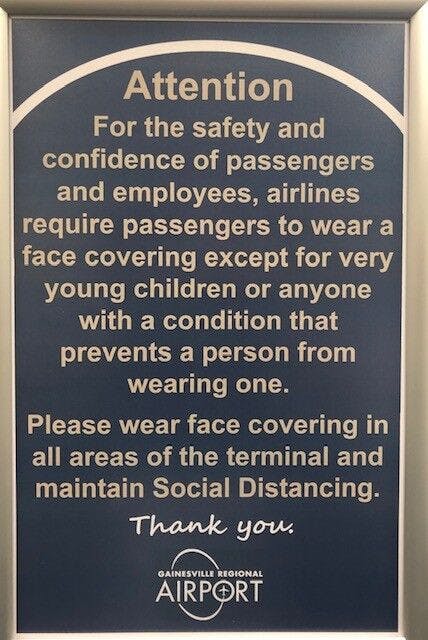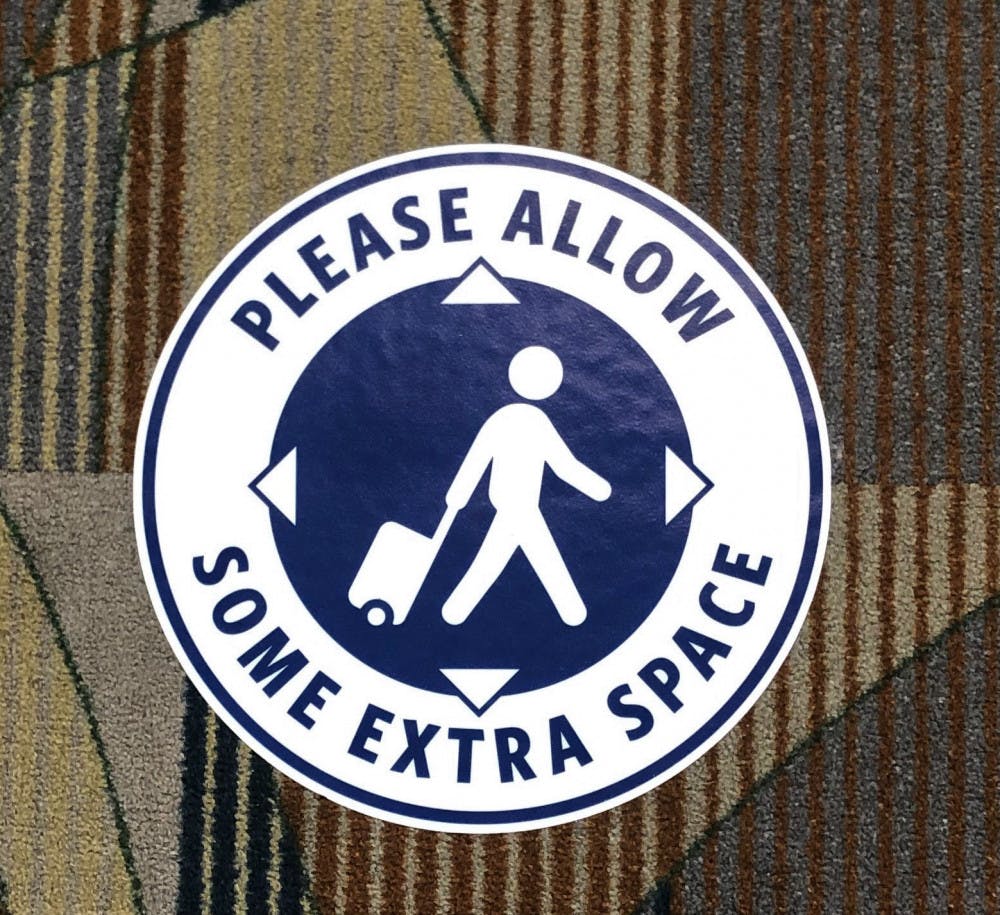While COVID-19 is forcing some people to stay home, tens of thousands of Alachua County residents and students are still traveling across the state — whether it’s for work, family or long-distance relationships.
The Centers for Disease Control and Prevention warns that travel increases the spread of COVID-19, but the need for long-distance travel can sometimes be unavoidable. In the first week of September, Alachua County residents took more than 139,000 trips within a distance of 10 to 250 miles, according to a report from The U.S. Bureau of Transportation Statistics.
Gainesville Regional Airport has remained operational throughout the COVID-19 pandemic for residents who still wish to travel, said spokesperson Erin Porter. Before the pandemic, Gainesville Regional Airport, located at 3880 NE 39th Ave., broke personal records for air travel in Alachua County.
“Last year at our airport, we set an all-time record for arrivals and departures ever since it has been in existence,” Porter said.
But in March, air travel decreased 95%, she said. As of August, flights are down 65% from their all-time high of last year. The airport announced that nonstop flights to Miami resumed Sept. 17, after six months of inactivity.
Staff and travelers are required to wear face masks, she said. There are also new hand sanitizing stations, plexiglass partitions in front of customer service desks and increased sanitation of high-touch services.
“As far as passengers being noncompliant, to my knowledge, there haven’t been any big problems at all,” Porter said. “It has been a pretty smoothly run operation.”
Porter said air travel can be safe if passengers follow airport rules.
“Every piece of the equation in aviation has responded to the pandemic,” she said. “It maybe took a while for things to get lined up properly and to respond to conflicting health information that was out there.”

A sign at the Gainesville Regional Airport noting the mask requirement and encouraging social distancing.
Inter-city bus lines, such as Red Coach and Greyhound, are also a popular option for travelers.
Red Coach, based out of Orlando, is one of about five bus companies still operating during the pandemic, said Vice President Daniel Sant’Ana. The other most active line is Greyhound, and smaller ones like Flixbus don’t travel on a daily basis.
Three Red Coach routes stop in Gainesville, and all buses are operating at a reduced capacity, Sant’Ana said. The 56-seat economy bus now only seats 44 passengers, and the 48-seat business class bus seats 30, with every other seat in the inner rows empty.
Ridership on Red Coach’s Gainesville routes is already down by 72% this year compared to before the COVID-19 pandemic, Sant’Ana said. The company also saw a similar decrease in overall income from last year.
Employees and guests are required to wear face coverings at all times in bus terminals and onboard, he said. Hand sanitizer stations also have been installed in the bus terminals.
The lack of demand for inter-city bus travel is also affecting Greyhound. The number of buses they run nationally will decrease temporarily, according to an update on its website.
Like Red Coach, Greyhound requires mandatory face masks, increased sanitation and air filtration and physical distancing when boarding and disembarking buses.
But when Katherine Blosser, a 19-year-old Santa Fe biological sciences freshman, took a Greyhound bus from Gainesville to Miami in early September, she said she felt unsafe.
The bus was nearly full and didn’t allow for proper social distancing, she said.
She said Greyhound oversold tickets and that passengers were forced to sit in seats that weren’t supposed to be used.
“I feel it’s less safe than a car with two to four people, compared to a bus filled with strangers,” Blosser said.
A Greyhound spokesperson wrote in an email that the company isn’t conducting COVID-19-related interviews. Face masks are required on Greyhound buses, even people who are considered medically exempt, according to its “Peace of Mind” website policy.
“We are encouraging customers to use extra space to create physical distance from one another, where possible,” the website reads.
Blosser travels during the pandemic to see her Miami-based boyfriend. She since decided that carpooling is the safest option, and she now uses a carpooling Facebook group to find rides. Hundreds of students living in Gainesville request carpool rides through the same group, and many other platforms like it exist in college towns throughout the U.S.
When carpooling, Blosser said she wears a face covering at all times, maintains as much distancing as possible, and limits face-to-face interactions at rest stops.
“I have some concerns as far as contact with the driver, they might be infected and not showing symptoms,” she said. “I am still concerned, but I am going to take precautions and try to pursue my relationship.”
Contact Alan at ahalaly@alligator.org. Follow him on Twitter @AlanHalaly.
A stick on the floor of the Gainesville Regional Airport promoting social distancing.

Alan Halaly is a third-year journalism major and the Spring 2023 Editor-in-Chief of The Alligator. He's previously served as Engagement Managing Editor, Metro Editor and Photo Editor. Alan has also held internships with the Miami New Times and The Daily Beast, and spent his first two semesters in college on The Alligator’s Metro desk covering city and county affairs.






